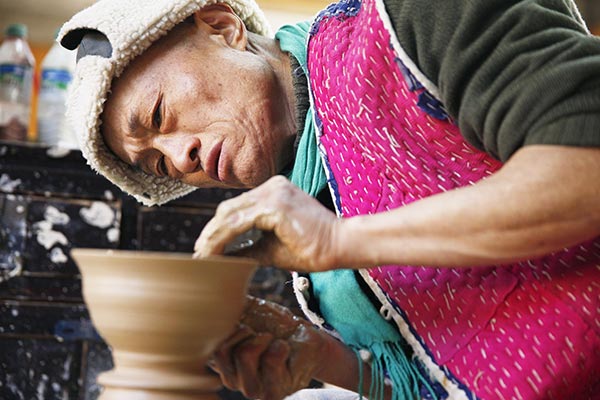Artist Li Jianshen makes porcelain ware at a workshop in Jingdezhen, Jiangxi province. Many artists have come to the "Porcelain Capital" to strike gold in the business.[Provided to China Daily]
Artists realize painting landscapes on china and ceramic ware doesn't always hit pay dirt in Jingdezhen

Near Jingdezhen's bustling Lianshe Road, Hu Weiping crams into his tiny studio and toils for hours bringing bland china vases to life with delicately painted landscapes.
Eight years ago, Hu left a well-paid job in his hometown Nanchang, capital of Jiangxi province, to make and sell porcelain paintings in Jingdezhen, a city dubbed China's "Porcelain Capital". But with little reputation, his business is "just so-so" and now he is struggling to make ends meet.
"Sometimes I do not sell a single vase for a whole week," the 53-year-old said. "Of course, life in Nanchang was much better, but this is where my passion lies."
Hu is among the many who have flocked to Jingdezhen to seek success in the porcelain industry. Known as Jingpiao-"floating population in Jingdezhen"-this group of people mainly consists of Chinese painters and ceramics graduates.
Around 20,000 Jingpiao lead a life adrift in Jingdezhen currently, according to figures released recently by the Jingdezhen government. But making dreams come true is proving to be no easy task in the ancient city. Many Jingpiao are put off by a lack of recognition, poor work environment and low market prices.
Jingdezhen's history of porcelain-making spans 1,700 years. The city's unique clay resources and time-honored craftsmanship have made it a Mecca for porcelain admirers and tourists alike.
With increasing disposable income, government support and a good reputation, porcelain business has soared in Jingdezhen in recent years, leading many to settle in the city, according to Li Wei, associate professor at the Jingdezhen Ceramics Institute.
"The effect of porcelain paintings can be amazing after being burnt in the kiln, so a good number of Chinese painters come to learn porcelain painting in Jingdezhen, to seek artistic breakthroughs," he said.
"Jingdezhen's porcelain is a hot commodity throughout the world," Li said. "Paper painters can make more money by selling the porcelain paintings, while graduates with porcelain-making techniques can also strike gold in the business. That's why so many people choose to become Jingpiao."
The city government has set up porcelain markets and hosts a variety of exchange activities to support the industry.
Each year, 30 to 40 percent of graduates from the Jingdezhen Ceramics Institute, China's only college with focus on porcelain and ceramics, choose to stay in the city, according to the institute.
Leading the life of a drifter is not easy, however. Whether they come to seek artistic breakthroughs or to make it big in the porcelain business, they must survive by starting from scratch. Most choose to make and sell porcelain products to earn living expenses.
To save money, many Jingpiao choose to live in Laochang and Laoyatan, two of Jingdezhen's cheap rural-urban fringe zones, to craft porcelain products.
Yu Jingfeng, a painter from Anhui province, said his studio in Laochang, a suburb with poor housing facilities, costs less than 1,000 yuan ($154) a month. His neighborhood is full of garbage and deserted houses. Yu's studio is filled with peeling paint, mud and clay.
"I once posted a picture of me making a porcelain vase on the Internet," Yu said. "Many of my friends asked if I was working at the site of an earthquake."
Porcelain prices are also quite low, unless "you have become a well-known porcelain master", Yu said.
A famous craftsman's work can fetch as high as 1 million yuan, while the work of a non-famous craftsman is only a few thousand.
"It's not that their work is insanely amazing, it's purely celebrity effect," said Yu.
Even on good days, Yu's average daily income is less than 100 yuan.
"If you don't sell your work cheap, people will buy from other artists who do," Yu said.
Many Jingpiao have to work for the "famous masters" free of charge to "accumulate experience" before they can start on their own, Yu added.
Despite all the hardship, many young drifters seem optimistic about future.
Xiao Ye, 25, came to Jingdezhen to start her own porcelain business after graduating from a college in Hubei province four years ago. Her monthly salary ranges from 2,000 yuan to a few thousand more, depending on the business of selling porcelain souvenirs at weekend markets. She also rents a shabby studio for a few hundred yuan to make the souvenirs.
"I came here because I am interested in porcelain," she said. "I don't think I am drifting, because I have a place to live, and I am doing exactly what I want to do."
Since coming to Jingdezhen, Xiao Ye has sent much of her savings to her poverty-stricken family in Hubei.
"It's not so bad here," she said. "My friends often tell me 'tomorrow will be better', and I always believe in that."
To help Jingpiao develop businesses, the city government has rolled out a series of pro-artist policies in recent years, including giving out low-interest microcredit and subsidies, and establishing "entrepreneurship incubators" to encourage artists to get business-savvy. So far, more than 7,900 people have benefited from the micro-loans, according to the government.
"Today's Jingdezhen is a huge magnet, attracting many from across the country," said Li, the associate professor. "They choose to stay because they have hope in their dreams, their career and their future."
Gao Haoliang and Shen Yang from Jiangxi contributed to this story
